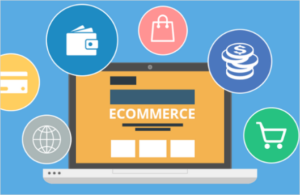
E-Commerce marketing is a great way to raise brand awareness, build trust, and make sales. An eCommerce marketing strategy is a long-term commitment, but it improves brand image and organic traffic, and will eventually help conversion rates soar.
We can help you build an e-commerce website if you want to sell your products directly from your website by starting your online shopping portal. When enterprise brands with online stores invest in digital marketing campaigns, they tend to prioritize paid advertising and social media for fast turnarounds. But, when you dig into the metrics that drive real marketing ROI throughout the sales funnel, they all point to content marketing.
Furthermore, if we expand the definition of e-commerce marketing to include SaaS, then the opportunity really explodes. Through that lens, content can include webinars, podcasts, templates, white papers, case studies, and so much more.
Ecommerce content marketing improves SEO performance content marketing for e-commerce sites delivers a major advantage when it comes to search engine optimization (SEO).
When you consistently create and optimize high-value content around relevant keywords, you attract organic search traffic that you typically would have to pay for in the form of advertising. And that translates to massive savings considering the better return on investment of SEO vs PPC.
Plus, a well-executed SEO strategy delivers compounding organic traffic over time, leading to new customers and greater revenue. Compare that to paid media, where traffic goes to zero if you stop buying ads.
The benefits of e-commerce SEO go beyond ranking in the search engines, traffic, and lower costs. In a commissioned study, Forrester Consulting says the following about the broader business value of SEO. Content marketing is one of the most effective ways an e-commerce brand can differentiate itself from the competition.
Ecommerce content marketing enables brands to cover every step of the buyer’s journey.
Ecommerce content marketing allows online retailers to build deep, authentic relationships with their audiences.
With the entire world lunging toward digital customer experiences, e-commerce content marketing can give you the edge to beat your competitors. It’s one of the most cost-effective ways to generate brand loyalty while increasing online sales in the process.
Below, I’ll explain why e-commerce content marketing is so powerful. I’ll also reveal nine different strategies you can use to achieve greater ROI.
Why e-commerce content marketing gives you a strategic advantage
When enterprise brands with online stores invest in digital marketing campaigns, they tend to prioritize paid advertising and social media for fast turnarounds. But, when you dig into the metrics that drive real marketing ROI throughout the sales funnel, they all point to content marketing.
Furthermore, if we expand the definition of e-commerce marketing to include SaaS, then the opportunity really explodes. Through that lens, content can include webinars, podcasts, templates, white papers, case studies, and so much more.
Ecommerce content marketing improves SEO performance
Content marketing for e-commerce sites delivers a major advantage when it comes to search engine optimization (SEO).
When you consistently create and optimize high-value content around relevant keywords, you attract organic search traffic that you typically would have to pay for in the form of advertising. And that translates to massive savings considering the better return on investment of SEO vs PPC.
Plus, a well-executed SEO strategy delivers compounding organic traffic over time, leading to new customers and greater revenue. Compare that to paid media, where traffic goes to zero if you stop buying ads.
The benefits of e-commerce SEO go beyond ranking in the search engines, traffic, and lower costs. In a commissioned study, Forrester Consulting says the following about the broader business value of SEO.
FORRESTER CONSULTING
Marketers often see that customers who come to their sites through SEO tend to be more loyal, leading to greater lifetime value. They engage more and spend more time on their sites.
Ecommerce content marketing completes the customer journey
Content marketing for e-commerce companies should span the entire customer journey map, from the moment when a prospect becomes aware of a problem, through the purchase, and even retention. By creating content that solves a specific problem, educates the prospect, or offers valuable information, your brand can be present every step of the way as a customer progresses through the journey.
If your content is limited to only product pages (as is the case with many e-commerce retailers), your customer touchpoints may be limited to the final stages of the customer journey. In turn, this leaves major gaps for your competitors to swoop in and help address your prospective customers’ needs throughout the majority of their buyer journey.
Content marketing differentiates your brand
Unless you’re selling a one-of-a-kind product, differentiation can be really hard in the e-commerce world. Content strategy can help set you apart. It allows you to show off your brand personality and attract customers who otherwise might not be particularly loyal to a specific brand or product.
Red Bull is a great example of this. They don’t necessarily have the best energy drink. In fact, many people would argue that it tastes pretty bad. But, by relentless content marketing, mostly in video, they’ve built a protective moat around their brand.
Features
- Easy Store Management
- Unlimited Products & Categories
- Easy to customize
- Fully Responsive
- Easy to customize

